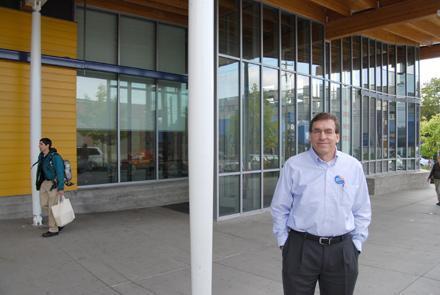Healthcare is major issue for Burbank
JOHN BURBANK. Democrat John Burbank will run against Democrat Reuven Carlyle for the 36th District state house seat being vacated by veteran Helen Sommers.<br><br>
Mon, 10/13/2008
John Burbank, Democratic candidate for the 36th District, said he is staying in the race against fellow Democrat Reuven Carlyle despite losing to him in the August primary because voters deserve a choice in November.
"In a democracy, people need a choice," Burbank said. "And they have a pretty good choice in this election."
Despite losing to Carlyle in the primary by 4.5 percent, or just over 1,200 votes, in what Carlyle characterized as a solid victory, Burbank said he is not worried and does not think he needs to make up any votes on Carlyle.
Burbank said the primary election was a nonevent for many voters and less than one-third or registered voter cast ballots. Voters who were absent for the primary could push his total, he said.
The 36th District Democrats made Burbank their official nominee after the primary, which he said could help his vote count as well.
"We start all over again in the general election," he said.
Burbank has been active in local politics for many years. He said he wrote the state's minimum wage policy that automatically raises to keep up with inflation, expanded the cigarette tax in 2001 to aid the state's basic health plan, and was instrumental in helping pass the legislation for paid family leave. Burbank was also chair of the 32nd District Democrats in the 1980s when Ballard was part of that district.
Burbank said his highest priority if elected would be securing universal health care for all Washington residents.
Health care is often too expensive for many people and small businesses, leaving many families uninsured or struggling to pay for coverage, he said.
"I think that is the most immoral part of our society," he said.
Burbank said he supports mandatory health care because the state cannot afford to let the population continue to get sicker and more desperate.
To pay for universal health care, Burbank said he would work to push insurance overheads down to 12 percent and use the state's bargaining power to negotiate down the price of pharmaceuticals.
Burbank said his second major concern in Washington is the education system.
The system needs more funding, smaller class sizes, especially for elementary schools, and less of a focus on the WASL he said.
Burbank said he would specifically like the state to pay for full-day kindergarten and six periods of high school for all children. Currently the state only pays for half-day kindergarten, except for 20 percent of children, and five periods of high school.
Full-day kindergarten would cost the state $130 million per year and six-period high school would cost $115 million he said. Burbank said he has been working on public education funding with Bill Gates Sr. and is confident that funding can be acquired.
The problems of being a low-influence freshman legislator in a state with a predicted budget deficit are looming in Olympia for Burbank if he is elected.
Burbank said he would deal with the deficit by changing Washington's regressive tax structure of a property and sales tax, but no income tax, and working to close corporate tax loopholes.
To aid the majority of Washington's residents, Burbank said he would implement an across-the-board 12.5 percent reduction in the property tax. To compensate for that, he would create a 5 percent income tax for anyone earning more than $200,000 per year, which is about 3 percent of Washington families, he said.
To stimulate business, Burbank said he has a plan to exempt the approximately 90 percent of businesses that make less than $1.5 million per year from the state business and occupation tax. The plan would cost the state $300 million per year but could be paid for by closing corporate loopholes, he said.
Burbank said he could combat his lack of influence as a freshman legislator with his ability to cross partisan and geographic lines. He said he has been endorsed by 22 legislators, as well as by both Republicans and Democrats from Eastern and Western Washington.
"I have a relationship with these legislators that is ongoing and respectful," he said.
Because of Washington's new top-two primary system, Burbank and Carlyle made it past the primaries to the general election while the Republican candidate Leslie Bloss was dropped.
The closeness of the race is leading both candidates to spend a lot of money on their campaigns; Carlyle said his campaign will cost approximately $250,000, while Burbank said he will spend at least $200,000.
Burbank said he proposed a campaign spending limit of $100,000 but Carlyle rejected it.
Michael Harthorne may be reached at 783.1244 or michaelh@robinsonnews.com


